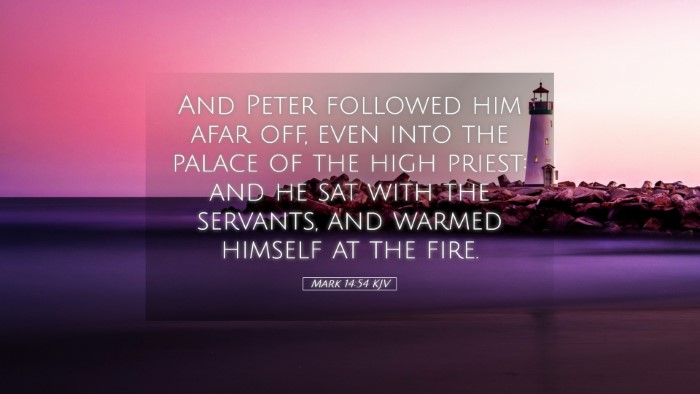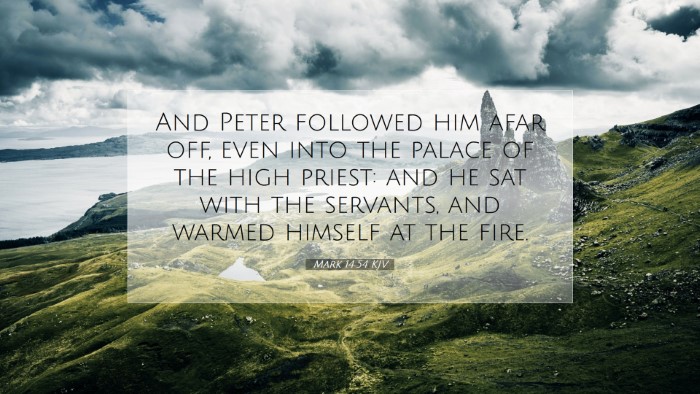Commentary on Mark 14:54
Text of Mark 14:54: "And Peter followed him afar off, even into the palace of the high priest: and he sat with the servants, and warmed himself at the fire."
Introduction
This verse marks a crucial moment in the narrative of Peter's denial of Christ. It begins the dramatic unfolding of events leading to the crucifixion of Jesus, emphasizing both Peter's loyalty and his impending failure. By examining insights from respected public domain commentaries, we can draw meaningful lessons from this passage for pastors, theologians, and students of the Bible.
Contextual Analysis
Mark 14:54 occurs following the arrest of Jesus in Gethsemane. As Jesus is taken to the high priest's palace, Peter grapples with both fear and loyalty, attempting to stay close to his Lord despite the danger. This context underscores the themes of discipleship, fear, and temptation prevalent in the Gospels.
Matthew Henry's Insights
Matthew Henry emphasizes Peter's courage and subsequent cowardice. He notes that Peter followed Jesus "afar off," suggesting a distancing not only physically but also spiritually. Henry poignantly writes that Peter had once boasted of his loyalty but now demonstrates a fear that leads him into a precarious position. Henry draws attention to the significance of being close to Jesus and the dangers that arise when believers attempt to follow Him while maintaining distance.
Albert Barnes' Commentary
Albert Barnes elaborates on the implications of Peter's actions. He points out that Peter's desire to follow Jesus into the high priest's palace represents both a desire to stay connected and a hesitance to fully commit. Barnes highlights that the fire mentioned in the verse serves as a metaphor for the "coldness" of the world and the warmth of fellowship that believers find in Christ. He cautions that one’s proximity to Jesus and His suffering does not always equate to unwavering faithfulness.
Adam Clarke's Contributions
Adam Clarke provides a rich historical and cultural context for this verse. He notes that the high priest's palace would have likely felt unsafe for Peter, given the hostility toward Jesus. Clarke emphasizes that Peter's choice to sit with the servants by the fire symbolizes a retreat into the safety of company that does not follow Christ. This act of blending in reveals part of the human condition—our inclination to compromise our faith for acceptance.
Theological Reflections
- Discipleship and Distance: The concept of following Jesus "afar off" serves as a salient warning to modern believers. It reflects the struggle between loyalty to Christ and the fear of worldly repercussions.
- The Nature of Temptation: Peter's situation illustrates the complex nature of temptation and fear. The choice to remain at a distance ultimately led to his denial, a reminder of the spiritual vigilance required in the life of a believer.
- Grace in Failure: This narrative highlights the grace available even when we falter. Despite Peter’s shortcomings, he is restored, and his story concludes with a powerful reaffirmation of faith and service (John 21:15-19).
Lessons for Pastors and Theologians
Ministers and scholars can glean several important principles from Mark 14:54:
- Encouragement in Weakness: Recognizing that fear and failure are part of the human experience can encourage congregants. Pastors are reminded to address these vulnerabilities with compassion, pointing toward restoration.
- The Importance of Community: Clarke’s focus on Peter's environment stresses the need for Christian accountability and encouragement within the church. It is essential to foster a community that uplifts and supports one another in faith.
- Calling to Vigilance: The warning against following Christ at a distance serves as a call to vigilance within the church. Encourage congregants to be fully committed and prepared to face persecution for their faith.
Conclusion
Mark 14:54 is a pivotal verse that opens up deep theological discussions and reflections regarding discipleship, fear, failure, and grace. By examining this passage through the lens of historical commentaries, we recognize the enduring relevance of Peter's experience. It serves as both a cautionary tale and a testament to God's mercy—a reminder that even when we stumble, His grace is sufficient to restore and empower us for the journey ahead.


